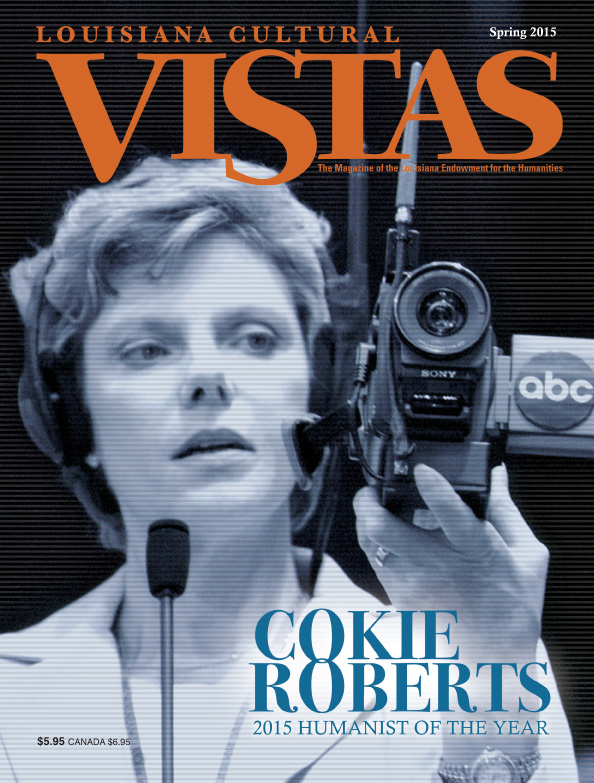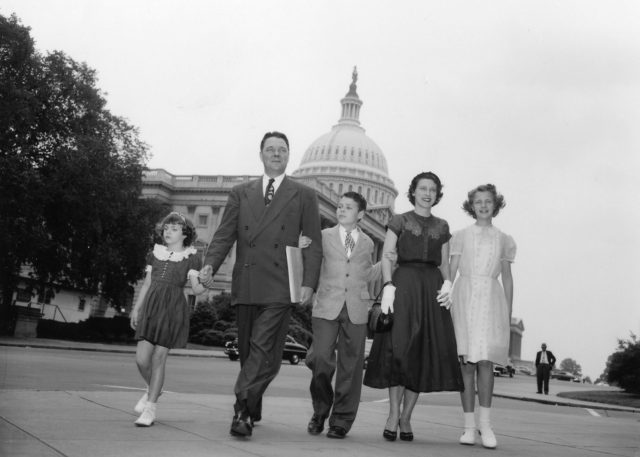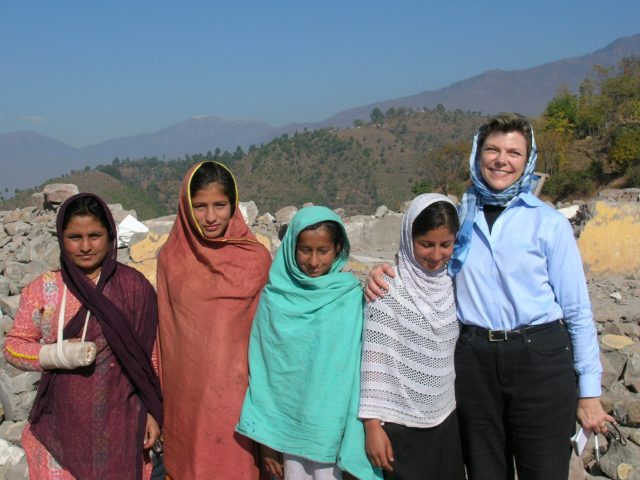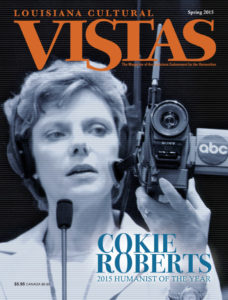Spring 2015
A Conversation with Cokie Roberts
In 2015 the Louisiana Endowment for the Humanities honored broadcast and print journalist and author Cokie Roberts as Humanist of the Year.
Published: September 17, 2019
Last Updated: September 17, 2019

Photo by Steve Fenn/ABC.
Spring 2015 cover of Louisiana Cultural Vistas magazine featuring Cokie Roberts as LEH Humanist of the Year.
In 2015 the Louisiana Endowment for the Humanities honored broadcast and print journalist and author Cokie Roberts as the 2015 Humanist of the Year, a recognition awarded to individuals who have made invaluable, lasting, and recognized contributions to Louisiana’s cultural landscape.
Born Mary Martha Corinne Morrison Claiborne Boggs on December 27, 1943, in New Orleans, Roberts was raised by two of Louisiana’s most prominent Democratic politicians. Her father, Hale Boggs, served in the U.S. House of Representatives for 28 years, from 1941–1943 and 1947–1972, at which time he went missing following a plane crash over Alaska. Her mother, Lindy Boggs, ran for office in her own right after the declared death of her husband and served in the same Congressional seat for 18 years (1973–1991). She later accepted an appointment by President Bill Clinton to serve as the U.S. Ambassador to the Holy See (Vatican) from 1997–2001.In her more than 40 years in radio and television broadcasting, Roberts won countless awards, including three Emmys. She was inducted into the Broadcasting and Cable Hall of Fame and was cited by the American Women in Radio and Television as one of the 50 greatest women in the history of broadcasting.
In addition to her appearances on the airwaves, Roberts, along with her husband, Steven V. Roberts, wrote a weekly column syndicated in newspapers around the country by United Media. The Robertses were also contributing editors to USA Weekend Magazine, and together they wrote From This Day Forward, an account of their more than 40-year marriage and other marriages in American history. The book immediately went onto The New York Times bestseller list, following Roberts’ number-one bestseller, We Are Our Mothers’ Daughters, an account of women’s roles and relationships throughout American history. Roberts’ histories of women in America’s founding era, Founding Mothers, published in 2004, and Ladies of Liberty, published in 2008, also became instant bestsellers.
David Johnson, editor of Louisiana Cultural Vistas, sat down with Cokie Roberts in 2015 to ask questions about her career, her connections to her home state, and her views of contemporary and historical politics.
DAVID JOHNSON: Many of us know you by way of your broadcasting career, on National Public Radio and as an ABC television reporter and political commentator, but perhaps fewer people know of your background and history here in Louisiana. You are a descendant of one of the most famous men in the state’s history, William C. C. Claiborne, the first territorial governor of Louisiana following the Louisiana Purchase. You have said that politics is the family business. Your father, followed by your mother, served in Congress representing Louisiana’s Second District. Tell us more about your connection to the state.
COKIE ROBERTS: Being from Louisiana, but particularly New Orleans, is almost like an ethnicity. We have our own food, our own music, we talk our own way, and there’s such a sense of connection that pretty much everyone I know from New Orleans feels that even when you don’t live there for long periods of time, you still feel that it’s home. I do think that because of my long history with family there, the many decades of my parents’ service and their carrying for the state and the people of the state, that the connection is even stronger.

U.S. Representative Hale Boggs and his wife Lindy accompany their children, Cokie, Tommy, and Barbara, at the Capitol, 1950. Courtesy of the Boggs Family Archives.
DJ: Your mother lived at the very heart of the Second District in the French Quarter. Some might say she lived in the belly of the beast, along a noisy stretch of Bourbon Street. How did a woman who ultimately became a U.S. ambassador to the Vatican arrive at such an address?
CR: She lived right in the middle of the honky-tonks. When my kids were small I’d walk with them past the strippers and the other neighbors and say “Over the river and through the woods to grandmother’s house we go!” [Laughter] Her aunt Frosty Blackshear—don’t you just love these names?—bought the house in the 1940s or ‘50s. Frosty was a very prominent real estate woman in New Orleans and she ran her office out of that house. When she bought the house, her sisters, one of whom was my grandmother, were horrified, and they said to my mother “Lindy! Lindy! Go talk sense to her. Tell her that she can’t live in the French Quarter”—which was not as nice then as it is now. Mama went down to see Frosty and went into the house and realized that she had some sort of real connection to the house. She felt like she had been there before, that she knew where every room was, and she just loved the house. So instead of talking Frosty out of buying the house, she talked her into leaving it to her.
DJ: Many of us were the beneficiaries of her hospitality. She opened the house to so many for social and charity functions during the years she lived there.
CR: Including the Republican Convention of 1988. She hosted hundreds and hundreds of Republicans.
DJ: That was a true testament to her grace. Speaking of which, we watched your mother navigate Washington with grace. She won a seat in the House of Representatives in 1973, a seat formerly occupied by your father, Hale Boggs, from 1947 until he went missing in a plane crash in 1972. What was your mother’s secret to getting legislation passed and making her voice heard on Capitol Hill?
CR: First she was phenomenally charming—the definition of charm. But she was also remarkably persistent—graciously persistent—she wouldn’t let up. So it was pretty much easier to just say yes the first time because people came to understand that they weren’t going to say no.
DJ: I want to discuss a few of your books. Your most recent is Founding Mothers: Remembering the Ladies, a children’s book that is adapted from your research that went in to writing Founding Mothers: The Women Who Raised Our Nation. What drew you to writing about women in the colonial and revolutionary era and the earliest years of our republic?
CR: Of course, I had grown up seeing my mother and her cohorts and very influential political women and I had written a great deal about women in politics. Because I cover congressional politics, I’ve had to spend a lot of time with the Founding Fathers—I know them all by first name—because if you’re going to write about questions like the right to bear arms or religion in the public square, things that have become constitutional questions, you need to go back and see what they said. When people say “the Founders said,” you need to know whether they are telling the truth or not. So I spent a great deal of time with the men and realized I knew nothing about the women. I started trying to find out about the women and realized that there really hadn’t been much written about them at all, and that if I wanted to know about them, I’d have to do it myself. And once I found out about them, I decided I might as well write about it.

Cokie Roberts meeting with young women while on assignment in Pakistan-administered Kashmir, outside the capital city of Muzaffarabad.
DJ: What lessons do you want to impart to children?
CR: I want children to understand that the country was founded by all of the people here, not just half of them. People say to me all the time, “It’s so good for little girls,” but what do you mean? It’s not just good for little girls—yes, it’s nice that girls know that there were people who looked like them who were important to the founding of the country—but boys need to know that, too! People will tell me, “Oh, I don’t have any daughters. I can’t buy that book.” But wait, do girls just read about women and boys about men? I don’t think so.
DJ: You are now writing a book about women in the Civil War. What have you discovered in the course of your research?
CR: I’ve come to understand that World War II, which was in my lifetime—barely, but was—was very significant in terms of how it affected women’s roles, and many of the same things are true in the Civil War. I’m focusing on women in Washington and how the war changed women throughout time and regardless of place.
DJ: Can you elaborate on that for us and tell us more about the women you wrote about in the book?
CR: One of the things that I particularly noticed when we were living abroad was how you could go to a playground and the women, without speaking a common language, could still communicate. We all recognized each other, you know we could all push the swings together, and we could all feed the babies together, and we could all be there together in a comfortable way and have a form of communication. And I think that is true no matter where you are. In terms of time, again, while we were living in Greece I was so struck by the archaeological museums, which are many, and looking in the cases and seeing such familiar objects. There was one in particular, it was this little museum near Marathon that was Bronze Age, and there in the cases were cooking utensils, needles, buttons, jewelry, makeup pots, and it was just so completely familiar from thousands of years ago. You could open those cases and just pick up where those women left off. Whereas the objects that were there that were connected to men were objects of war or worship. So unless you were a priest or a soldier there wasn’t a lot of connection.
DJ: You watched your mother work among her colleagues in Washington, and yet we still hear stories of obstacles that women face in the political arena. What issues do women confront that perhaps men do not when they run for elected office?
CR: Well, women face in every arena the obstacle that men don’t listen to them. I always joke that men just wait for your lips to stop moving. And that this is true in every arena. There was a recent Sheryl Sandberg piece in the New York Times about this subject titled “Speaking While Female.” But that’s harder in the political arena, where you really do need people to listen to you in order to convince them to vote for you, or to convince them to work on your legislation, or whatever. That’s a genuine problem all around. It’s also true that women in politics have to ask for your vote and many women have been raised to believe that it’s rude to ask for something for yourself, to put yourself forward, and there’s always that line of not being assertive enough or you’ll be labeled quote-unquote aggressive, which is a negative term when applied to women. And in terms of nuts and bolts, that makes it hard to raise money.
DJ: Let’s discuss the book that you coauthored with your husband, Steven Roberts, From This Day Forward, appropriately titled for a book about marriages, including your own. You write that you are Catholic and Steve is Jewish, and that your marriage and the raising of your family blended both religious traditions. Was that difficult?
CR: No, it wasn’t difficult. It got busy, it’s still busy—a lot of holidays. This past year I started Hanukkah a few days before it actually began because I couldn’t cook two big meals like that so close together, Christmas and Hanukkah, 50 guests at each. Look, for the Christians, Christianity is built on Judaism. If you look at something like Passover you see how Easter emerges from it, and all of the symbolism and all of the language of the Paschal Lamb, all of that, are all rooted in Judaism. I think for the Christian it is easy and enriching. For the Jewish partner, it has to be more generous, but Steve has always been very much, very generous.
DJ: You also write about marriage from a historical perspective, including the marriages of slaves. What did you learn?
CR: I really hadn’t thought about the fact that slaves were not allowed to marry. I’m sure that somewhere along the line I knew it, but I just had never focused upon it until I read those slave narratives. And now that I’m working on the Civil War book, I’m seeing it again, and of course, when you have generations of people who have been denied the right to marry, to have their families threatened at any time with breakup, with people being sold to different places, it’s bound to have an indelible mark on the whole concept of family and family life. I had not fully understood that until I read those narratives.
DJ: I was very impressed by the eulogy you delivered at the funeral for former First Lady Betty Ford in 2011. In that speech you stressed the bipartisan camaraderie that existed in the Congress of your parents’ generation. Many observers would say that such across-the-aisle friendships are a thing of the past, and that we are living in an era of extreme political division and gridlock. Why is that so, and can anything be done to bridge the divide?
CR: It’s really very hard to bridge the divide. One of the things that was true, as I said in that eulogy—where I would have been utterly terrified if Mrs. Ford hadn’t told me exactly what she wanted me to say—is the fact is that in that era, Congressional families all moved here to Washington and we all got to know each other the normal way, through the schools, the moms at the PTA, the church, and running into each other at the cleaners. It was normal, and now the families aren’t here and they don’t build those kinds of relationships. It’s true too that the country itself has become much more partisan. People tend to move to where there are like-minded people, and so the members of Congress represent a much more homogeneous group of constituents, and the way district lines are drawn, it’s even more homogeneous. With computers you can find a one-eyed veteran who votes Democratic and put him in your district. And you combine all of that with the fact that we in the media tend to give our microphones to the loudest screamers and it just creates a very partisan and polarized atmosphere, without any other institutions intervening to change it.
DJ: The Washington you knew as a child was largely dominated by men who served in Congress after serving in World War II. Did that have an effect on bipartisanship?
CR: Now we hardly have any veterans in Congress. We have no World War II veterans. We lost our last three World War II veterans at the end of this last election. Back then it was very different, the Congress was filled with veterans, particularly right after World War II where there were these enormous classes of people who ran self-consciously as veterans—the men who went, not the men who sent. And it was men—the Republican class of 1946 and the Democratic class of 1948—who were of different parties but they were of similar experience. And they were very clear that they knew who the enemy was. It was the dictator across the sea and not the guy across the aisle.
DJ: You serve on the board of the National Trust for the Humanities. Tell us about that.
CR: Well the National Trust for the Humanities exists to support the National Endowment for the Humanities and the whole concept of promoting the humanities. I think that is one of the great legacies of President Johnson. That was a period of creating these institutions to promote scholarship and learning and the mission of history, all of it, in states and local communities as well as at the national level. It is an incredibly important endeavor especially as the schools spend less time on some of these questions, particularly historical questions.
DJ: Your father served in the House of Representatives during the tumultuous years of the Civil Rights Movement and legislation that ensured African Americans their full constitutional rights. He took a bold stand as a congressman from a Southern state and voted in favor of the Voting Rights Act. What was that time like for your family?
CR: It was very difficult. It was a very tense time, particularly in Louisiana. At times it was very hostile. There was a cross burned on our lawn, and it was a little teeny-weeny lawn in the Garden District. And the attitude of people who we thought were our friends could be very hostile. I remember my father being at a fancy New Orleans party among fancy New Orleans people, and he had to turn around to a woman and tell her, “Stop being so rude.” She was very taken aback. She couldn’t imagine that she could be rude when it came to discussions about race. People often said outrageous things, and I think we’re seeing that again today.
But it was also true that there was a tremendous response on the part of the African American community that made it very clear what the right thing to do was. It really did come out of a set of values that my parents strongly espoused which relates to the Baltimore catechism question of “Who is man? Man is in the image and likeness of God.” And they really believed that. Once you believe that, everything else flows from that.
Excerpted from the spring 2015 issue of Louisiana Cultural Vistas.
